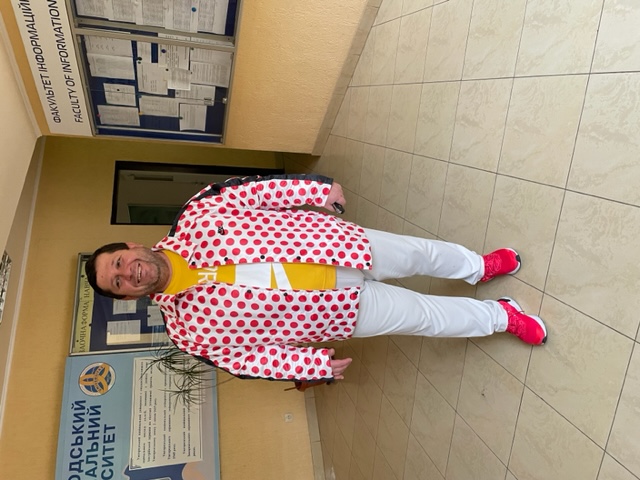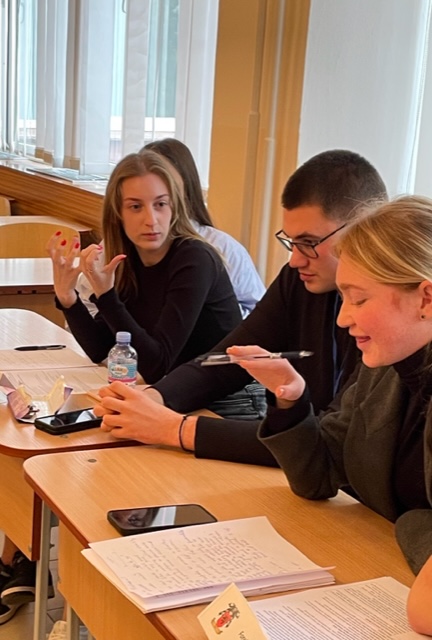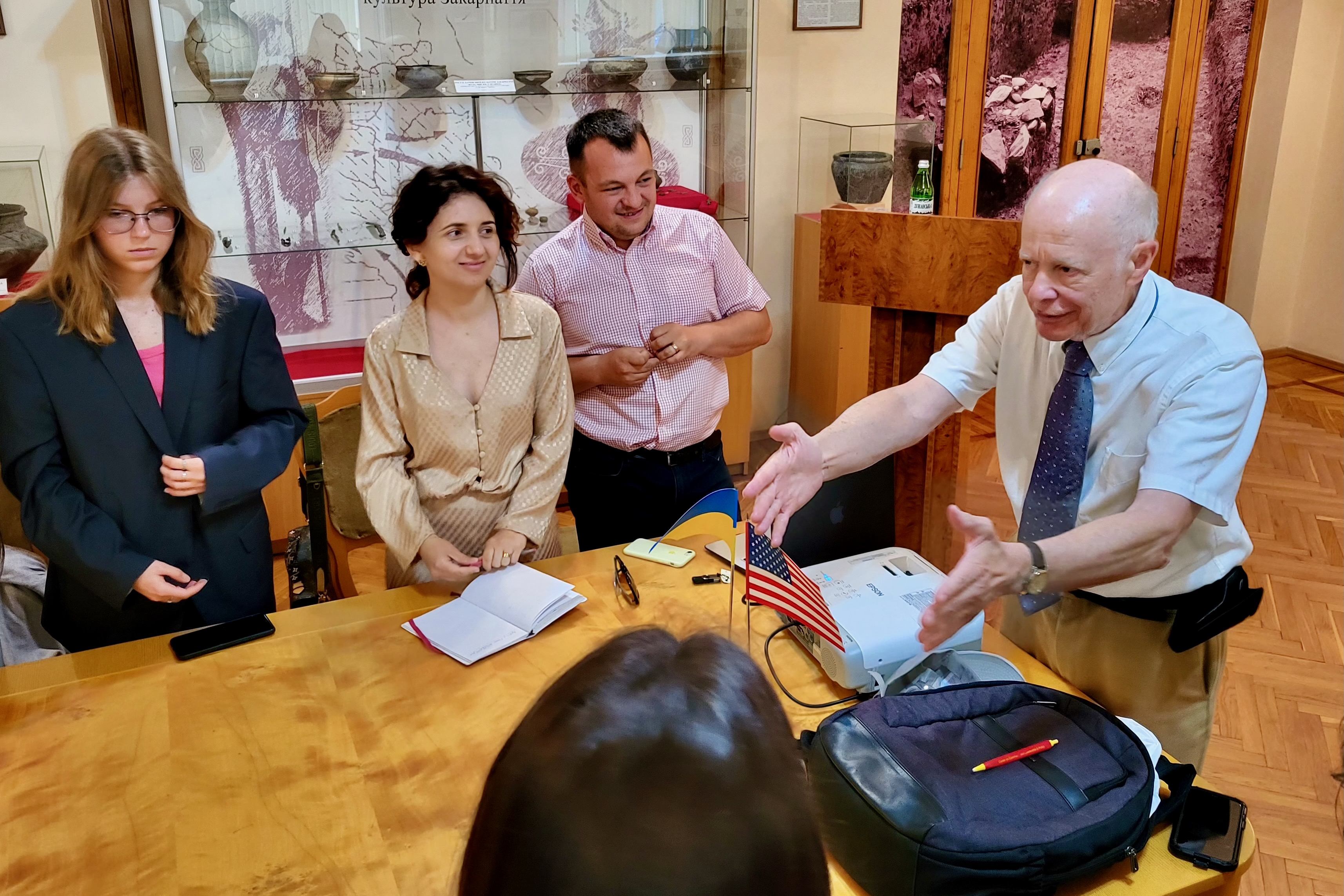Training Ukrainians to Manage International Conflict, by Daniel Whitman
Youth everywhere love to act (that is, play a role other than their own), and are very good at it. Ukraine was no exception in training that I offered to university students on October 24-26.
Council on Foreign Relations simulations in combination with others have universal appeal and develop communication and negotiation skills at warp speed. Using CFR videos and spliced materials from the National Museum of American Diplomacy plus some home remedies of my own, I found brilliant learners in Transcarpathian Ukraine at Uzhhorod National University (“UzhNU”). How and why I was there for the occasion -- that would be a longer story, maybe for a future blog.
From Uzhorod to “Budan”
 After a 30-hour journey from DC, I arrived to a wonderful welcome from the faculty of History and Foreign Affairs, UzhNU. Pictured, Dean Vitaly Andreyko in vacation garb, though he was putting in eight-hour days to do his part in Ukraine’s current campaign to “Build Back Better.” His undergraduates there are tough, eager, and very quick studies.
After a 30-hour journey from DC, I arrived to a wonderful welcome from the faculty of History and Foreign Affairs, UzhNU. Pictured, Dean Vitaly Andreyko in vacation garb, though he was putting in eight-hour days to do his part in Ukraine’s current campaign to “Build Back Better.” His undergraduates there are tough, eager, and very quick studies.Not three weeks after dramatic events in the real Nagorno-Karabakh, we took a fictional scenario calling for resolution of political tensions at the border of two unfriendly nations, one the uneasy home of a religious and ethnic minority with affiliations to the majority of the neighbor. The analogy was not lost on the group at UzhNU.
In an unwelcoming “Budan,” the “Rubit” minority flees across the border to a willing but resource-poor “Gilbia.” Neighboring countries, UN’s High Commissioner for Refugees (UNHCR), the United States, and a civic group calling for equal treatment of minorities worldwide all get into the act.
The CFR website has videos with perfect scene-setters, giving a tactile sense of the tone and pacing of simulations that call on students to manage (not resolve) crises very similar to ones in real life. Students move quickly into role playing – it comes naturally to them – and they delight in simulating controversy, argument, feigned indignation and self-defense. Using a hybrid of CFR’s simulations, while adapting and grafting them to related materials, produces a pedagogical blend for varied settings.
Twenty undergraduates at UzhNU brought passion and skill to the exercise, quickly transcending language barriers and taking on their assigned tasks with enthusiasm. Even in retrospect I can’t say exactly if their main motivation was to build skills for crisis management, or just have fun – or both.
Four “delegations” piled pretty uniformly on the unpopular Budanese, who in turn ably defended themselves against condemnation from the others. The Budanese took on the role of villains with eager petulance. They were almost scary in their fierce defense of national sovereignty and strong arguments against others’ “interference in internal affairs.”
The Workshop
 The four-day workshop included a Monday session of general comments on crisis management and prep for the exercise. On Day Two we ran the migration scenario for 90 minutes, followed by reflection and wrap-up. The students were required to write a short after-action report (AAR) in English and did so very ably.
The four-day workshop included a Monday session of general comments on crisis management and prep for the exercise. On Day Two we ran the migration scenario for 90 minutes, followed by reflection and wrap-up. The students were required to write a short after-action report (AAR) in English and did so very ably.On Day Three we discussed related topics with a PowerPoint for the occasion: policy, tactics, strategy, causes of conflict, and a brief reflection on George F. Kennan’s “Long Telegram” of 1946.
Day Four concluded with a second scenario, this time a resource crisis regarding fresh water shortages on a fictional island composed of five countries. The scenario presupposed a basically friendly process, but with different interests regarding fresh water capture in urban and rural settings. In fact, there seemed to be more acrimony in the second scenario, likely because the students had learned quickly from the earlier, more political setting, and were eager to test the limits of interaction.
The Value of Simulations
In six years of conducting simulation workshops in universities in Washington, DC, I’ve found that fictional scenarios have two advantages.
- Personal emotions and judgements aside, students are free to dramatize, feign indignance and argue passionately while keeping their differences at a level of play-acting so as to depersonalize any real dissonances that may exist among the actors.
- Fiction can have a more evergreen effect, remaining relevant as world events and conflicts arise in real time.
Fun ... and the Future
 It's pretty evident that Ukraine’s future will be shaped by its emerging leaders. CFR and related materials jump start their mastery of the skills needed, with easy-going approaches to self-development, and something I could only call “fun.”
It's pretty evident that Ukraine’s future will be shaped by its emerging leaders. CFR and related materials jump start their mastery of the skills needed, with easy-going approaches to self-development, and something I could only call “fun.”I also personally benefited from UzhNU’s rare and unique hospitality. Teaching can yield no greater reward.
Photo: Dan Whitman on a previous visit to Uzhgorod. See his blog post on that visit.
[Note: in practice I’ve found far greater levels of anxiety among American undergraduates generally, and I admire Ukrainians’ abilities to shoulder the burdens of genuine conflict, making their way forward with pragmatism and the sort of grit others can only aspire to.]